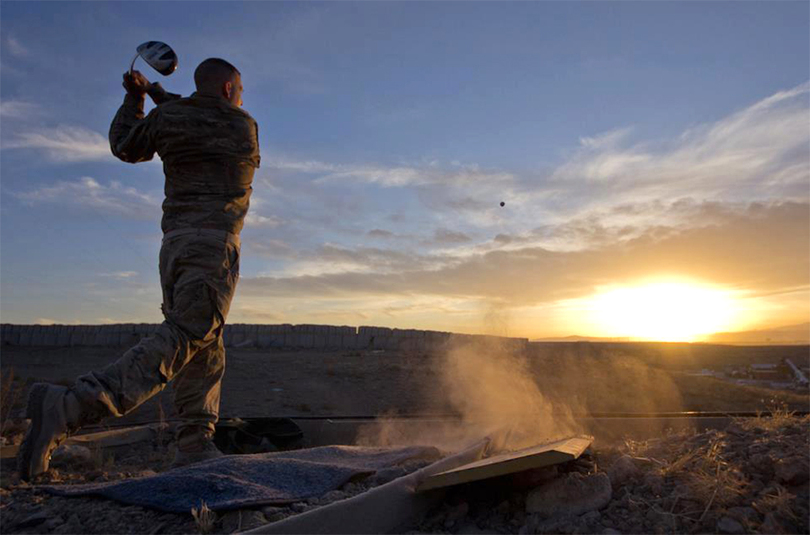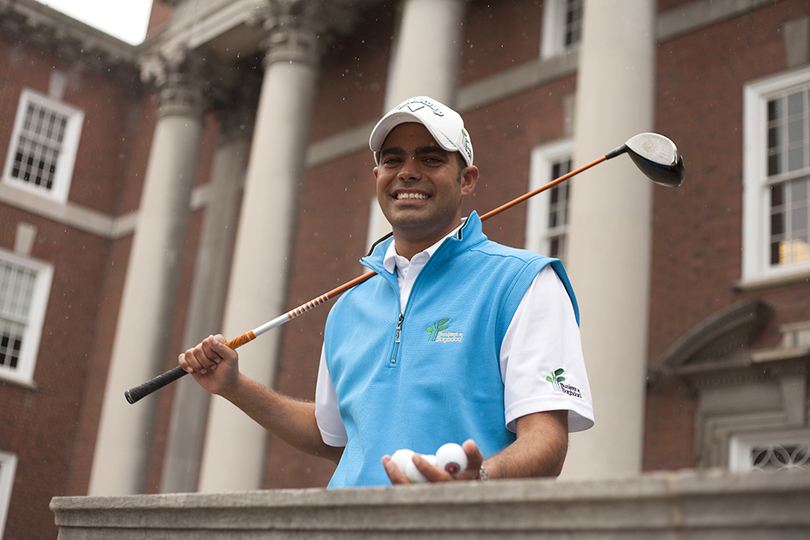Driving it home: Maxwell student comes to SU to improve golf nonprofit organization
About five years ago, Joe Hanna was watching “60 Minutes” when a piece came on about a day in the life of American soldiers in Iraq, showing them hitting golf balls into the desert during their downtime.
He then later read an article in Golf Magazine, which said hitting golf balls was a favorite form of stress relief for soldiers.
“It kind of struck a chord that the least I could do is collect some golf balls and some golf clubs and send them overseas,” Hanna said. “So I boxed them up and sent them out.”
In 2008, Hanna created the organization Bunkers in Baghdad, which collects new and used golf balls to ship to active duty soldiers stationed in Iraq and Afghanistan. To date, the organization has sent more than four million golf balls and more than 90,000 golf clubs. The nonprofit organization has sent golf equipment to all 50 states and to more than 20 other countries.
Currently in his first year at the Maxwell School of Citizenship and Public Affairs, Hanna, 32, is learning how to improve his charity. Commuting from Buffalo, N.Y., Hanna is in the process of earning a graduate degree in public and nonprofit management. Hanna is also a partner at Goldberg Segalla LLP, where he’s the chair of its sports and entertainment law practice group.
Financing, budgeting and differentiating organizational structures are just a few of things he hopes to gain from studying at Maxwell, calling the school “No. 1 in the country.”
But, the charity has humble beginnings.
It first started with what Hanna could find in his basement. Hanna gathered golf balls and clubs from around his house and shipped them out himself.
Now, pro golfers such as Arnold Palmer, Phil Mickelson and Jack Nicklaus have all donated equipment, and Callaway has donated thousands of golf balls and clubs as well, Hanna said.
Hanna currently runs the charity with two other people. More than 25 professional sports organizations contribute to Bunkers in Baghdad by holding collection drives for equipment at their stadiums, he said.
Hanna said in terms of active duty military members, Fort Drum, located about one and a hour north of Syracuse, receives the most equipment from the charity: more than a half million golf balls and 300 clubs, making it the charity’s largest domestic distribution point.
Currently, the organization is not connected with the SU Institute for Veterans and Military Families.
Daniel Savage, the chief of staff for the SU Institute for Veterans and Military Families, declined to comment specifically on Bunkers in Baghdad. It’s the institute’s policy to not comment on activities of other organization unless there is a partnership with IVMF, he said in an email.
“Of course the IVMF encourages all Americans to find ways to thank, give back, or serve those who have served in uniform, whether it’s by donating time or anything else,” Savage said.
The benefits of golf for active duty members of the military aren’t immediately obvious to people, Hanna said.
“It’s funny in that sometimes the initial reaction, not from military, but more from people who are just hearing about charity is they say, ‘golf equipment?’” Hanna said. “But then you explain to them how therapeutic it is. If you take a bucket of balls, anybody can whack them around and feel better.”
Maj. Eric Harrison, who served in Iraq at a military base north of Baghdad, said he got in touch with Hanna in 2009. It took two weeks for the golf equipment he requested to arrive, he said. The equipment helped ease the soldiers, he said.
Harrison said he and his soldiers were excited when the golf balls and clubs arrived.
“Soldiers seeing the new golf clubs and golf balls lets them know they’re not forgotten,” Harrison said. “And using the stuff was a great kind of stress relief. After missions or patrols, we’d come back and hit some golf balls and it’d be a great way to unwind and decompress.”
Harrison, who is now a legislative liaison for the U.S. Army in Washington, D.C., said his unit used the driving range they set up multiple times each day.
Throughout the years, Hanna has been able to make connections while working with different celebrities and athletes. The Chicago Blackhawks, he said, is the largest sports franchise that contributes to the charity — its general manager, he said, went to the same high school as him, and the star player Patrick Kane is from western New York.
The charity also holds collection drives at locations like golf courses and professional sports stadiums, he said. The locations that bring the most donations, Hanna said, are Buffalo, N.Y., and Rochester, N.Y., followed by Chicago and Houston.
The charity has grown significantly since it was founded, spreading mostly through word of mouth, Hanna said.
“When people ask, ‘Did you think it’d grow as quickly and as large as it did?’ My answer is ‘Yes,’” he said.
A key reason for its growth is the Bunkers Buddies program, in which elementary school students around the country write letters and draw pictures to be sent with the golf equipment, Hanna said.
“Not one package has gone overseas that didn’t include a letter or a picture to a soldier in there,” Hanna said. “The kids from those schools play a very important role in the charity, and we’re hopefully teaching them how to give back to community and how to make a difference.”
When he considers the future of Bunkers in Baghdad, Hanna said distribution won’t stop, even after U.S. troops leave Afghanistan.
“It is challenging at times — but as long as we continue to help our brave men and women here at home and overseas — that is all the incentive I need,” he said.
Published on September 17, 2013 at 2:10 am
Contact Brett: blsamuel@syr.edu | @Brett_Samuels27







